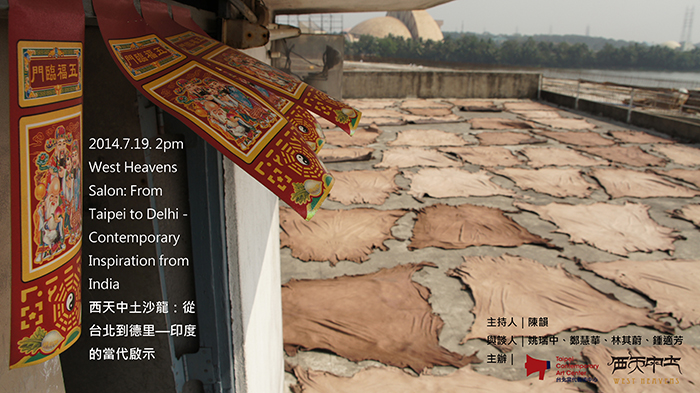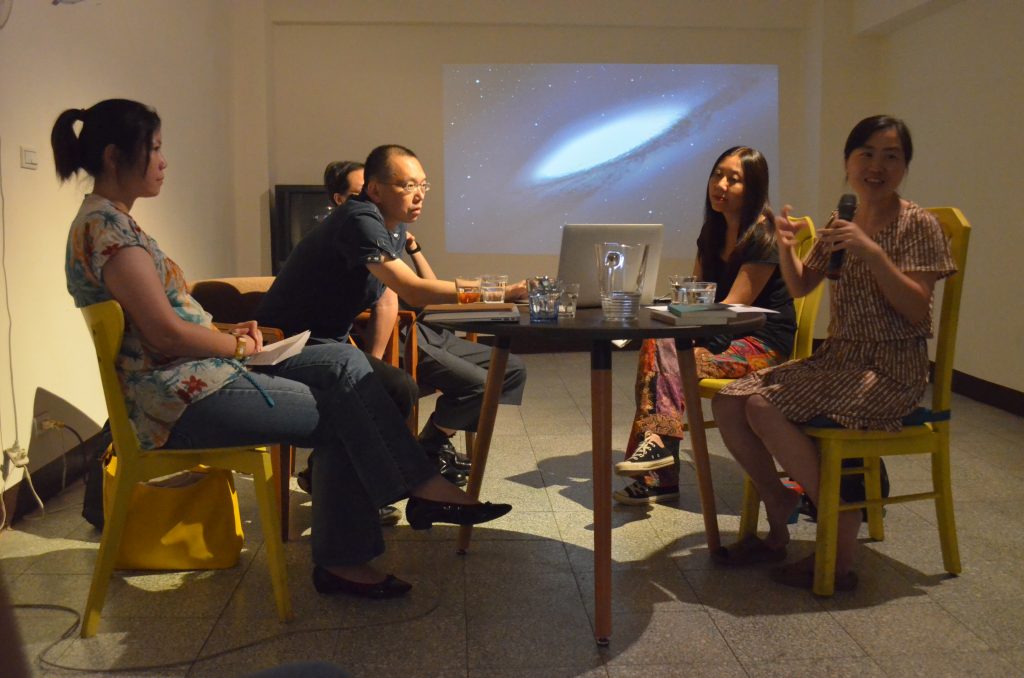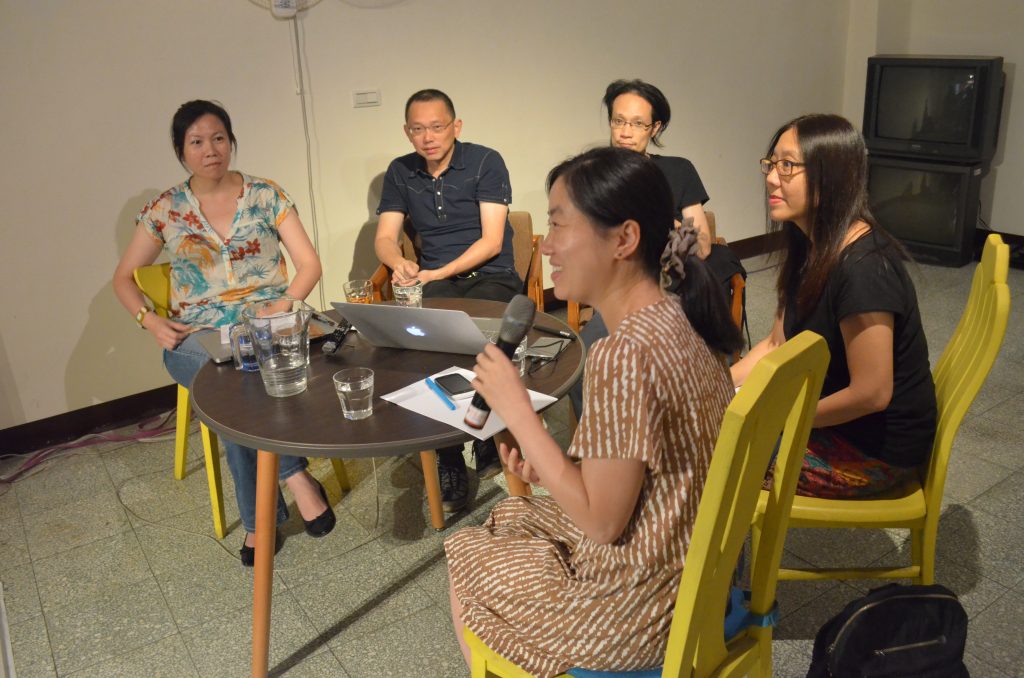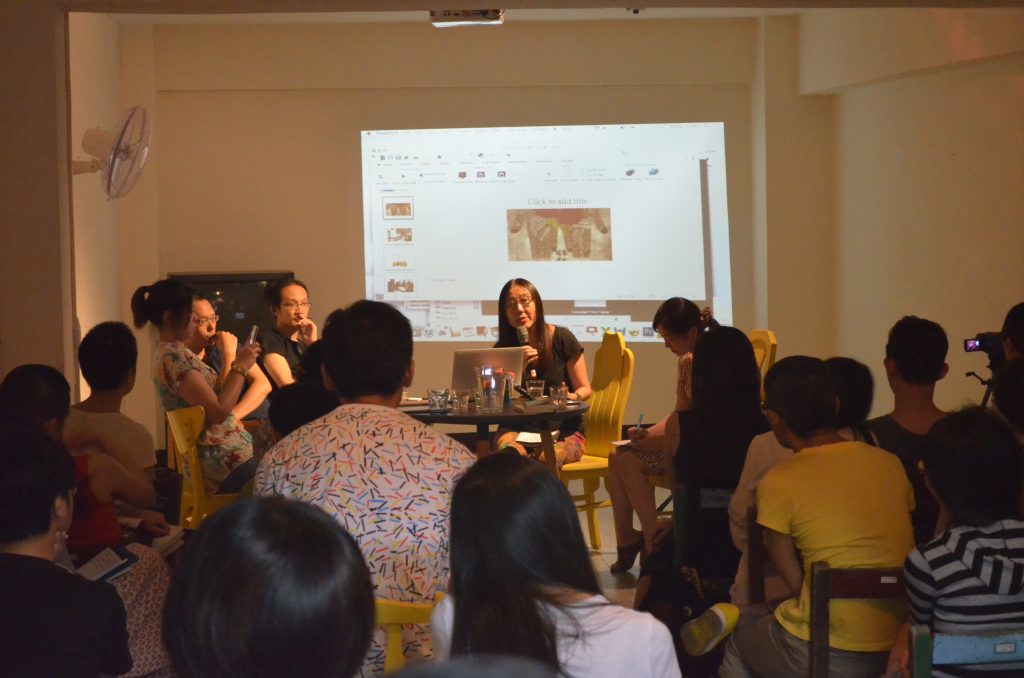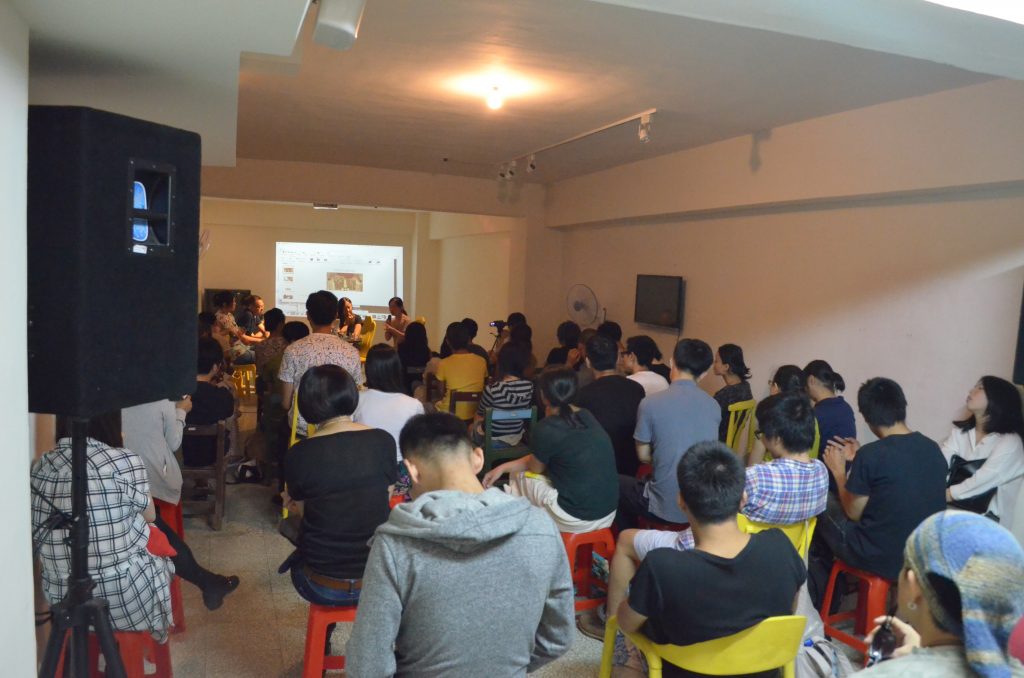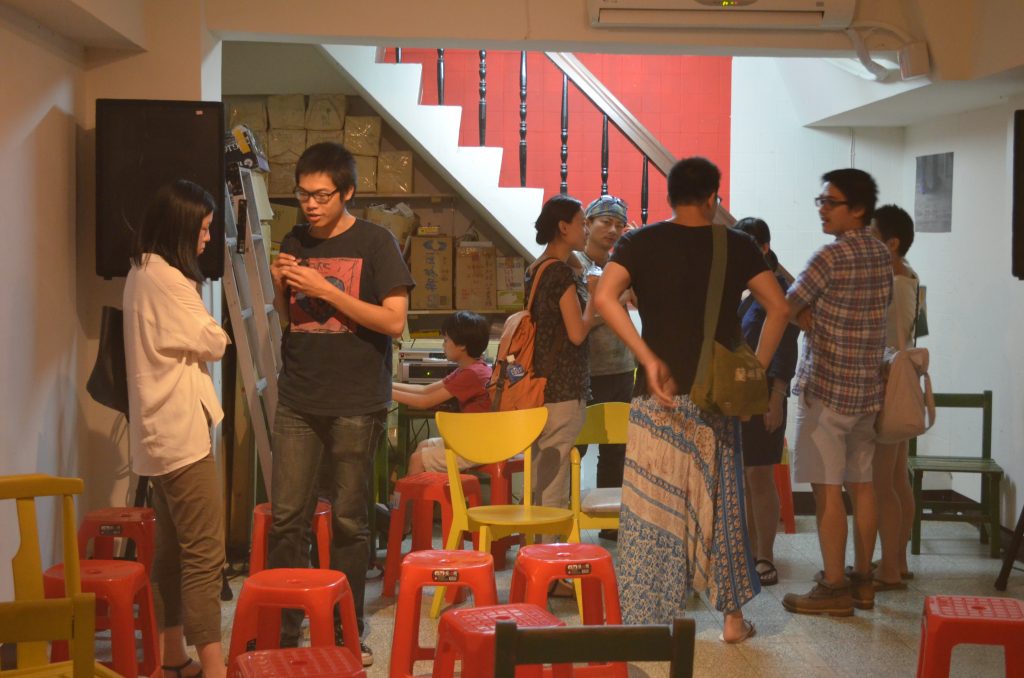West Heavens Salon: From Taipei to Delhi – Contemporary Inspiration from India
西天中土沙龍:從台北到德里—印度的當代啓示
(For English please scroll down)
(The speech is in Chinese. 演講以中文進行。)
主持人|陳韻
與談人|姚瑞中、鄭慧華、林其蔚、鍾適芳
主辦|台北當代藝術中心、西天中土
「西天中土」(www.westheavens.net)作為一個旨在於當代思想和藝術創作領域中,重新喚起中國對印度的當代想像、乃至反思自身現代性問題的綜合項目,在台灣亦產生了不小的影響。此次西天中土邀請了幾位在最近兩年中訪問印度的台灣藝術家、策展人和學者,請他們從自己的經驗出發,談論在自身的實踐領域中所受到來自印度的啟發和收穫,由此提出重新審視自身思想和工作的特別視角。
姚瑞中
藝術家,藝術批評家和策展人。1969年生於台灣台北,曾代表台灣參加1997年威尼斯雙年展、2005年橫濱三年展、2009年亞太三年展、2010年台北雙年展聯動計劃、2012上海雙年展,海內外聯展百餘次。2014年1月-2月,他受「西天中土」支持,赴印參加Raqs媒體小組策劃的「嵌入2014」(INSERT2014)項目。姚瑞中與社會失落檔案室的作品在賈瓦哈拉爾·尼赫魯大學藝術與美學學院的畫廊空間中展出。他還在該大學的藝術與美學學院中開設題為「基礎設施與廢棄建築」的工作坊。
鄭慧華
獨立策展人、藝術評論者,生於1970年。自1995年開始撰寫藝術評論及文化評論相關文章;2000年開始任《典藏今藝術》溫哥華特約作者,並為典藏《今藝術》、《現代美術》(台北市立美術館出版)、《YiShu:Journal of Contemporary Chinese Art》等期刊撰稿。她最近策劃的展覽包括2011年威尼斯雙年展台灣館:「聽見,以及那些未被聽見的─台灣社會聲音圖景」(威尼斯,2011)及國家文化藝術基金會年度策展專案「重/建社會」(台北,2011-2013)等。2011年她參與西天中土「藝術家特派」計劃赴德里考察,並策劃了「巫士與異見」展覽(香港,2013)。
林其蔚
藝術家,1971年出生於台灣台北。曾於輔仁大學習法文,國立藝術學院習傳統藝術、民俗田野,法國當代藝術工作室習新媒體創作。1992年開始繪畫、行為、聲音、影像創作發表,2012年發表《超越聲音藝術-前衛主義、聲音機器、聽覺現代性》一書。他最近參與的展覽包括:「重新發電」第九屆上海雙年展,上海當代藝術博物館,上海,2012等。他於2012年參加了德里Khoj藝術家聯合會的駐村。
鍾適芳
音樂製作人、策展人。於1993年成立以草根音樂為軸的音樂廠牌—大大樹音樂圖像。2001年,以遷徙流離為題,開創「流浪之歌音樂節」,透過年度音樂節慶形式,創造對話平台,提供各種文化議題與聲響實驗的可能。他目前也任教於政治大學傳播學院,兼任政大藝文中心主任。2011年第一次的印度行,旅行的終站在加爾各答的塔壩(Tangra),一個近百年歷史的華人社區,卻意外開啓了他另一段紀錄片的拍攝旅程。《邊界移動兩百年》是他在客家電視台支持下,完成的第一部紀錄片。影片以八個章節探見印度華人兩百年間的「來」與「去」、邊緣而碎片的歷史記憶,以及華人與印度主流社會間的隔閡。影片入圍2014年台北電影獎。
講座 文字記錄
文/何冠朋
西方中土計畫是由兩岸三地的學者及策展人發起,旨在探討中國於近代化的過程中,對話之相對方多為西方,因此引發由印度作為啟發,探討相對性及避開單向度的聯想,反思中國當代藝術的承擔及學術思想的發展。
一開始由與談人姚瑞中分享,藉由受邀至印度九天的參展過程中,於印度遊歷時看見沿路的廢虛建築及貧民窟所引發的受傷感,再接著探討印度主流社會階層所引發的混亂而帶出大學校園對言論自由的容忍而有許多不同在野黨所支持的校園組織的抗議海報於校園中喧鬧而有的特有現象,最後則回歸其專業領域的探討,對貧民窟存在而生的產權問題所引起印度難有閒置空間存在的討論。同樣於藝術家特派計畫下而有駐村印度的與談人鄭慧華將西方中土計畫限縮解釋為西天與土計畫,透過西天此一望向另一個西方的反思性來使自己重新看待知識生產,啟發對台灣在地文化生產交流的反思,也透過接觸當地藝術家及藝術創作引發出如對印度當地回教徒的不同觀點,而有著非常不同的身體體驗。另一位與談人鍾適芳則以入圍台北電影節以印度華人為敘事主軸的紀錄片拍攝的過程經歷為主軸,從當地華人的觀點出發,分享截然不同的印度體驗,提及了全無階級觀念的華人如何在主流階級制度的印度社會下取得認同,也分享了當地融合的中國文化足跡的特有生活方式,也就殖民政權及邊界問題所以發的對立情緒為分享,最後更是提出了沒有一個印度的觀點。
論壇以林其蔚的分享作為結尾,以地理學的角度解釋南北的差異,勾勒出屬於南方印度的瑰麗以呼應上位分享者的沒有一個印度的觀點,又再以翻譯學的角度去理解因未有一個國家的社會內涵及深度,在翻譯上其實是難以接觸到一個語言甚至到一個故事的根本,語言翻譯另一個語言的過程其理解上因而多有落差,因此如何翻譯才是最能觸碰到一個國家文化的內涵是值得深思的。結論上,則以四位與談人及主持人談及關於印度的左派作結,談到政治面影響文化及藝術的發展,本次沙龍觀點多圍繞在印度的當代藝術及中國的現代藝術發展之相似及差異,反思的過程激發了不同論述,值得深思。
專案團隊:謝欣芳,彭若瑩,賴瑋婷,張瑜庭,何冠朋,陳奕如
Hosted by Chen Yun
Speakers: Yao Jui-chung, Amy Cheng, Lin Chi-Wei, Chung Shefong
Organized by Taipei Contemporary Art Center, West Heavens
West Heavens (www.westheavens.net) is an integrated cross-cultural exchange programme initiated in 2010. It aims to untangle and compare the different paths of modernity taken by India and China, to facilitate high-level communication between the two countries’ intellectual and art circles, and to promote interaction and cross-references between the two countries through social thoughts and contemporary art. This time, West Heavens invites Taiwanese artists, curators and scholars who have visited India in past two years, toaddress their own observation and experience, sharing how they were inspired to examine their own values, attitudes and beliefs with a clearer and fresher vision.
Yao Jui-chung
Yao Jui-chung was born in 1969 in Taipei. He graduated from The National Institute of The Arts (Taipei National University of the Arts) with a degree in Art Theory. In 1997, he represented Taiwan in “Facing Faces-Taiwan” at the Venice Biennale and took part in the International Triennale of Contemporary Art Yokohama in 2005, APT6 (2009) and Taipei biennial (2010). He also participated in numerous large international exhibitions. Apart from working in the fields of theatre and film, he has taught art history, wrote art criticisms and curated exhibitions. In 1997, he attended the Headland Center for the Arts (San Francisco). He was invited by Raqs Media Collective to participate in INSERT2014 exhibition (2014, Delhi) and conducted a workshop in School of Art and Aesthetics at JNU.
Amy Cheng
Amy Cheng was an independent curator and art critic. She was born in 1970. She received her MA from the Graduate Institute of Art History at National Taiwan Normal University (Taipei). From 1997 to 1999, she taught history of Western art at Fu Jen Catholic University (Taipei). From 2000 to 2005 Cheng lived in Vancouver, Canada, and was a feature writer for ARTCO Monthly, where she currently works as a lead feature writer. Her art criticism has appeared in Chinese and English journals including Modern Art, YiShu: Journal of Contemporary Chinese Art, and Contemporary Art & Investment. She was invited by West Heavens to visit Delhi in 2011 and she later curated an exhibition for this Artist Dispatch Project, Shamans and Dissent in Hong Kong 2013.
Lin Chi-Wei
Lin Chi-Wei was born in Taipei, Taiwan, in 1971. He studied French literature in Fu Jen Catholic University, furthered his study in ethnology and art in National Institute of Arts in Taibei and practiced media art in le frenoy, studio national des arts comtemporains. Since 1992, he started to practice art through diverse mediums such as painting, performance, image, sound and etc. Lin also involved in research program on sound cultures. His first book, Beyond Sound Art – The Avant Garde, Sound Machines and the Modernity of Hearing is published in 2012. Lin Chi-Wei’s recent major exhibitions include: Reactivation: 9th Shanghai Biennale, Power Station of Art, Shanghai, 2012; Shenzhen & Hong Kong Bi-City Biennale of Urbanism \ Architecture, Shenzhen City Hall, Shenzhen, 2009. He was invited to Khoj, New Delhi for a sound art residency program in 2012.
CHUNG Shefong
CHUNG Shefong founded Trees Music and Art, a folk and root music label, in 1993. In 2001, Chung started Migration Music Festival, an annual music festival organized around the theme of “migration”, with the aim to provide a platform for integrating music and cultural issues, and sound experiments. Chung currently teaches at the College of Communication of the National Cheng-chi University, and is acting as the director of the NCCU Art and Culture Center. In 2011, she made her first trip to India, which has brought her to a later journey on documentary filmmaking. In 2013, she has completed her first documentary film From Border to Border. Taking place in Kolkata’s Chinatown, From Border to Borderrecalls the complicated relationship that continues to divide India’s ethnic Chinese and mainstream Indian communities. The film is nominated for 2014 Taipei Film Award.
Talk Highlights
Text/ Tiffany
Chen Yun moderated a conversation between four artists and curator, Yao Jui-chung, Amy Cheng, Lin Chi-Wei and Chung Shefong. The discussion was based on their experiences in India through the West Heaven program. Chen guided the conversation towards the complex culture in India, the diversity and it’s relation to the it’s neighboring country – China.
Before their trips to India, all four of the artist expressed that they had vague generalizations of what India would be like from it’s rich history, yet are less familiar with its modern culture. Thus, when arrived in India they all experienced different levels of cultural shock as they personally experience its rich diversity and multi-racial culture. Yao for instance was shocked by the extreme amounts of propaganda, social movements and riots within the universities. Chung on the other hand, have been in contact with indian culture since growing up although never step foot on the land until this project seem to have a very different experience. Through this experience in India she was able to put the missing pieces together and grasp what it truly feels like to be in India. Amy and Lin had more of a conventional cultural shock, they were surprised with the intense constant noise during the day and the diverse amount of flavors within the cuisine.
The three artist and one curator looked at very different aspects of the Indian society, yet all in correlation to the modernization of its society. They looked at issues such as racism, sexism, classism, the different political stances and the division of the poor and the rich. They discussed that the modern culture in India has resulted in a large gap between the rich and the poor, furthermore there is a large population living under the poverty line in India. The experiences of those who live in the slums is completely unimaginable, a completely different experience challenging all our prior knowledges of what we can experience through our six senses. The borderline communities in India is also another area of discussion. They were interested in what meant to live under a hierarchy system and consequently what it meant to be part of these borderline communities that are outside the hierarchy. Furthermore they looked at western influences, the results and aftermaths of colonial India.
After the discussion of India and it’s complex and diverse culture. The four artists and curator realize that a lot of the issues that arise among the indian society is not exclusive to the indian society and those issues are more closely related to the modern chinese society than we imagine. Chen Yun concludes that sometimes the smaller issues are deeper than one thinks and what one often expects is different from reality.
Executive Team: Ashley Hsieh, Jo Ying Peng, Tiffany Lay, Chang Yuting, He Guanpeng, Chen Yiru,

